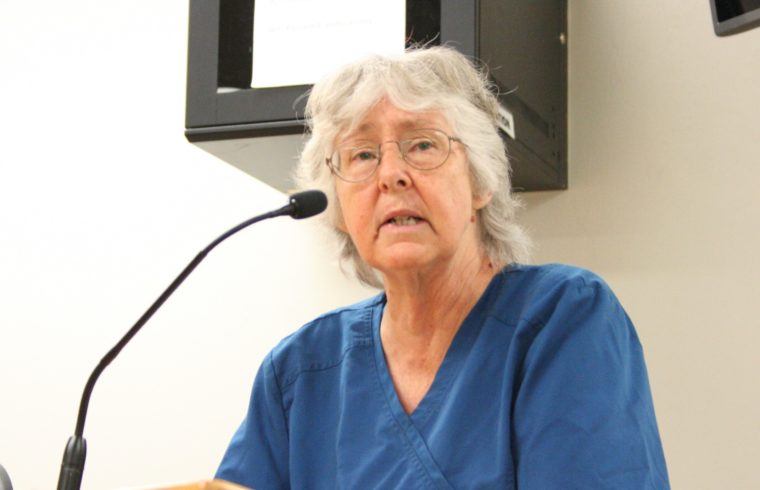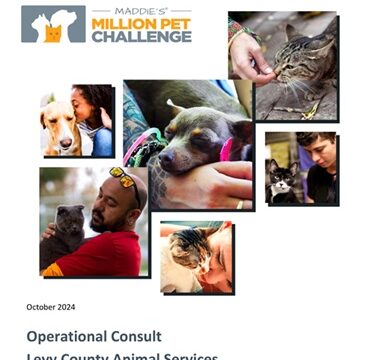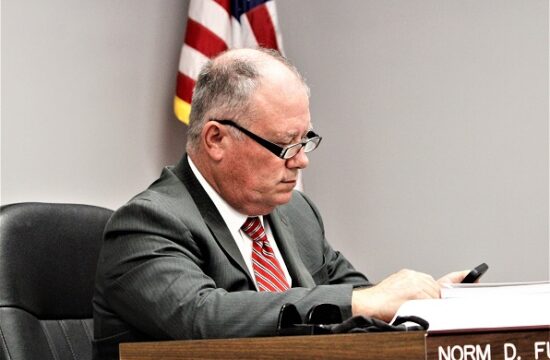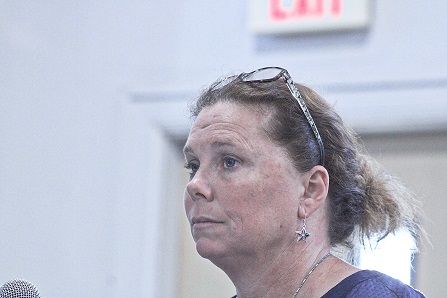Dr. Darlene Esler answers questions about why she always appears at board meetings instead of her boss David Weatherford.
By Terry Witt – Spotlight Senior Reporter
Dr. Darlene Elser, veterinarian for Levy County Animal Services was criticized Tuesday for taking the place of Director David Weatherford at county commission meetings and preparing reports and ordinances that should be his job.
The fiery exchange between Spotlight founder Linda Cooper and Esler erupted when Cooper demanded to know why Weatherford had not answered her two-week old public records request for a comparison of the cost of spay and neutering verses euthanizing animals.
Elser wouldn’t commit to deadline for giving Cooper the requested information. She said she had spent about an hour on the records request but she is working on revising the county’s animal ordinances and she has other duties to complete before she can get to the records request.
Cooper said Weatherford has not been present at county commission meetings to give quarterly reports on animal control operations for a year to a year and a half and now Esler was standing before the board responding to questions Weatherford should have been answering.
“I was just thinking that at $26 an hour he could provide us with a more in-depth report and let us know what we’re getting,” Cooper said. “Animal control is a bone of contention with most people. Elections are coming up. It’s going to come out there.”
Commissioner Lilly Rooks, who oversees animal services, disagreed with Cooper, saying “It isn’t (a bone of contention) for everyone. It’s a small group of people.”
“No it’s not,” Cooper responded.
Cooper said with the improvements that have been made at animal services including the ongoing construction of a new dog kennel, she felt it was a good time to “re-evaluate what we’re getting for our money and that’s what the taxpayers want.” Cooper said 50 pet rescue groups are saving animals at Levy County Animal Services, and the University of Florida helping the department. She said it’s time to get better use of the staff, volunteers and the $400,000 animal services budget.
Yankeetown Mayor Jack Schofield agreed with Cooper.
“There are people who do hear this. Being in a community where our taxpayers pay for animal services but yet get no services, that is a bone of contention,” Schofield said. “We really don’t get these services. You have to be aware that there are more people concerned about this issue than you may realize.”
Commission Chairman John Meeks said Weatherford missed the commission meeting because he was working with the Levy County Sheriff’s Office on a hoarding case.
Cooper responded that Weatherford has two animal control officers who could handle the job on a morning when Animal Services was on the agenda, but it was Esler who made the appearance instead of Weatherford.
Commissioner Mike Joyner sided with Esler and Rooks and argued Weatherford’s job isn’t just running the department. He responds to animal calls as well.
“It’s a whole lot more important to do your job out there for the citizens of this county (inaudible) than let someone just; than let people go without seeing animal control officer,” Joyner said.
Joyner said believes Weatherford has his priorities in order when he goes out on animal services calls during a county commission meeting, especially when he has someone “as capable of giving a report as Doc (Esler) is,” he said.
Cooper reminded commissioners that Animal Services purchased a $5,000 software known as Shelter Pro to make it easier to compile comprehensive reports on activities at animal control including spay and neutering, euthanasia and adoptions. She said animal control officers and office staff can input raw data and the software can be used to organize it into a report.
“If you feel like I’m attacking you perhaps a more in-depth report – like public safety does – though not quite as much is better; you have the resources in place; when those events come in, you input it in your program,” she said.
Cooper said the last animal services report “was something I could have put in Excel in 10 minutes.”
Esler said Cooper was asking her to prepare a report and take time out of her schedule when she could be doing spays and neuters.
“We’re playing word games here,” Cooper said. “Your staff will give you those numbers. Any staff worth their salt will give you those numbers. If you’re providing a budget to the board, you should be telling them how much it costs you for the drugs, how much it costs for spay and neuter.”
Esler said she can provide the cost of the drugs but it takes more time to analyze the cost of supplies for a spray and neuter and break down the costs. She said most cats weigh about 5 pounds and it is easy to make the calculations but when she has a 115 pound dog “there’s a tremendous difference.”
Meeks asked Esler to give him a date when she would have the public records request completed.
She said she doesn’t know.
“I put about in about an hour of work on it. I have all the information I need to do the calculation, but I don’t know when I’m going to be able to do that, and I’m going to tell you something; I’ve been working on these ordinances for the last two weeks. The day after we had our discussion after the last board meeting we began our TNR (trap, neuter release); That’s three full days of work. On Wednesday we’re having people drop off the animals; those animals have to be cared for, food has to be removed, the animals have to be placed in a safe environment; The second day is surgery, which we’re busy doing surgery all day long; there’s paperwork that has to be done with each of these surgeries and Friday is pick up and clean up. We have two rooms to clean up. The animals have to be picked up. The animals are discharged and we talk to the (people who pickup up the cats).”
Cooper said she understood.
“You need more volunteers, you need more help. Just get the information. As for the ordinances, that’s the director’s job, not the vet’s job; just saying. I hope to get that information in the next week,” Cooper said.
The county is revising its animal services related ordinances to bring them into the 21st Century.
Board of County Commission Regular Meeting May 21, 2019; Posted May 21, 2019













